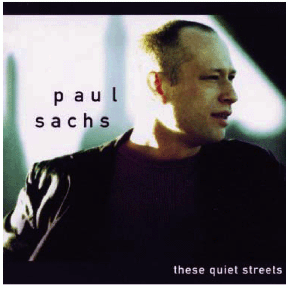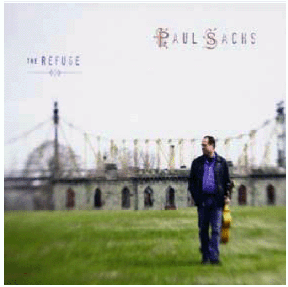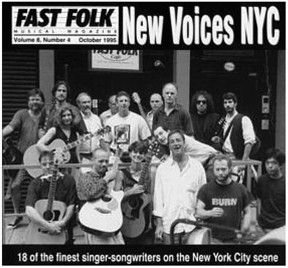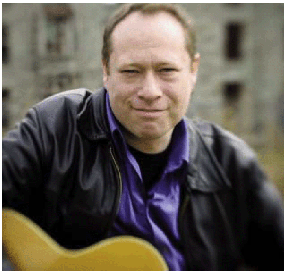Subway Art a Whole Lot of Jesus and Just a Little Coffee
Paul Sachs
up from these hateful streets
by Richard Cuccaro
Many folk/pop wannabees hear the call. Just a few are chosen. Some have talent, but no luck. Most just don't accept the goods.
On Tuesday nights in the mid-90's a host of aspiring singer/songwriters rode the New York City subway rails to Northward. Moore Street in Tribeca. They'd walk up the cobble-stoned street to the Fast Folk Cafe for open mic night. For a couple of years, this author was the volunteer managing director/host. Yet holding onto dreams of being a performing songwriter, I would occasionally play my own set. I'd prepare out the sign-up sheet on the snack bar and scout it fill upwardly. When I saw the name of a player who was on the light side in the talent department, I'd put my proper noun down subsequently him/her, figuring they'd make my meager ability look amend. One person I never followed was Paul Sachs. His guitar chops were boilerplate for that crowd, but he was/is a gifted, powerful tenor. On any 1 of my frequent runs to a store exterior, to re-stock the snack bar, if he was playing, I could hear him from downward the street.
After the demise of the Buffet, through the efforts of Acoustic Live to promote under-the-radar talent, nosotros kept in touch on with Paul. He played numerous showcases for Audio-visual Live and took out ads with us for new CD releases.
Like many others, I heard Paul'south large voice and my attending span stopped at that place. I finally paid closer attention to his writing and was stunned at its
eloquence. Information technology was fourth dimension to complete our picture of the whole man.
On a common cold rainy nighttime, we met in Cafe Dante, a pocket-sized West Village coffee shop, i of his favorite haunts, for an interview. In the back, away from a few customers up front, he told his story.
Beginnings
From Brooklyn, the Williamsburg Span spills into Delancey Street on the Lower Due east Side of Manhattan, out onto the fringes of Alphabet City, a few blocks to the north: Avenues A,B, C and D from 14th Street to Houston Street. Gentrifying now at warp speed, in the 60's and lxx's it was a wino's heaven, a junkie's paradise. Onto the streets around Ninth Street and Avenue C, a immature Paul Sachs walked, to make his associate with the earth. He and his friends created a rubber haven, as best they could, playing in the streets and empty lots. Children formed their own platoons and fought their own skirmishes. Bicycles were stolen away and stolen back. The drugs and the
alcohol weaved in and around their lives.
Paul'due south father, Danny Sachs, was an actor and writer and had worked in Hollywood under the stage name Danny Jackson, particularly in Preston Sturges films. He also worked on the venerated 50's TV variety evidence, Sid Caesar'due south Show of Shows, as a comedy author, for a year and a half. He as well wrote songs. Later, having moved east to New York, he met Paul's mother.
Throughout Paul'south childhood, his mother had emotional and concrete
difficulties and was in and out of hospitals. Information technology was Danny who became Paul'due south mentor and champion. Paul saw his father writing and emulated him. At 8 years old, late at dark in his bedchamber, secretly, past candlelight, he would take out his notebook and pretend that he was writing a great novel. He
started writing poetry at the historic period of 12 or 13. His father would type the poems for him at showtime, but taught Paul to blazon, so he could do it himself. Words and writing became sacred to Paul and take remained that fashion.
Paul was preturnaturally creative, but not especially suited for the rigidity of the public school arrangement. He hated school. I solar day, a teacher noticed her reluctant student reading poems and asked what they were. Paul replied, "These are poems I wrote." The teacher called him a liar, disbelieving that he could e'er exist capable of writing poetry. Paul was stunned that an "authority figure" would acquit then callously. Danny went in to have a talk with the teacher. This was one of the many times he'd visit school to stand up up for his son.
The Harry Chapin Effect
Danny wanted Paul to stay out of trouble, so he sent him to a camp out on Long Island. This particular campsite specialized in creative arts. Paul got into the theater grouping. He acted and danced as well, and had the time of his life. Ane day, Harry Chapin came to play a concert. This was a momentous occasion. Paul had been listening to his records at dwelling, particularly Verities and Balderdash, along with his father. Paul mentioned the vocal, "30,000 pounds of Bananas," which I'd never heard of. The large hit from that album was "True cat'southward in the Cradle." This was the showtime fourth dimension Paul had e'er seen anyone of this magnitude up close and it had a huge touch on on him. Sadly, Harry was killed in a car wreck well-nigh 6 months subsequently. Paul remembers how crushed he felt at hearing the news.
Lessons from Rimbaud
One of Paul's counselors took an interest in Paul'south writing and told him that he'd larn from reading the work of Arthur Rimbaud. So, like many before him, Bob Dylan included, Paul dove into the maelstrom of words, astounded and inspired past what he found. Rimbaud'southward A Season in Hell resonated strongly for Paul. Growing up on the Lower East Side, there were
elements of hell everywhere.
Danny also wanted Paul to play an musical instrument. No small surprise, Paul chose the guitar and started taking lessons. He played songs with his friends, at home in his bedroom, and worked on his writing. Others would approach guitar every bit a mode to become the next Eddie Van Halen, just for Paul, the accent was on setting his verse to music, writing songs. "That filled my globe," he says. He played the open mics at Folk City and The Speakeasy.
He had a task as an conductor at the Orpheum Theater on Second Avenue and management would allow him to busk at intermission. Paul would play outside the Orpheum, then "hit" the intermission at the Astor Place Theater, before heading back to work the terminate of his shift at the Orpheum. His powerful vocalization didn't set well with some bystanders, and he endured an occasional shower from a loving cup for h2o hurled at him and his guitar and case. Hearing that, I said, "That must've take a thick skin." "It still does," he replied. Paul formed a rock group that lasted for well-nigh a year-and-a-half. They played a set of six grunge-style songs that Paul wrote, over and over, at loftier school events.
While his father did his all-time to see that Paul avoided being a "street kid," insisting that he stay in school and get an education, elements of the street would chew away at the edges of Paul's life, threatening to consume him. The Urban center As School Alternative High School at Clarkson and Houston Streets in Soho was where they sent the misfits, kids who were considered unteachable in a "normal" classroom. And then, of class, this was where Paul was sent. He recalls that, among the hard cases, in that location were a lot of artistic types there also.
He had two sets of friends during high schoolhouse -- one was his old friends from his babyhood, and the other -- guys who rode motorcycles and engaged in larceny and consumed big quantities of booze and other recreational substances. While Paul was more often than not well-behaved, he had his wild side. He liked motorcycles, wearing leather, drinking, smoking, and using said recreational pharmaceuticals.
During the holiday season, he was selling Christmas copse in a very treacherous Hell'southward Kitchen. He was the only teenager in the group. The men were drinking private stock hidden in paper bags. Paul had long hair dorsum then, and the guys would transport him from the rubber of their wire enclosure, proverb "Hey 'Jesus,' become sell some Christmas trees!"
The Bottom Comes Calling

Around the time that Paul was 17 years old, his earth vicious autonomously. Danny was working as a Time/Life salesman and at Sam Flax selling art supplies to support the family, plus writing plays and songs. Paul had been working on a renovation job at the Second Street Theater. He came home for lunch 1 afternoon, to hear his father stumbling effectually in the bedroom and went to see what was the thing. Danny was obviously suffering from some mysterious impairment -- he couldn't function well enough to tie his shoes. He kept maxim "I gotta go to piece of work…" Paul said, "No, y'all tin can't." and put him to bed. And then, before his optics, his father, sensing that he was dying, said, "I can't get out you lot now…" He died right there. Paul had called European monetary system, but they arrived likewise late to do anything except tell Paul that his father had had a stroke.
Paul's mother was in the hospital over again, and so Paul was left alone, adrift without his anchor and his champion. He began drinking heavily and using an increasing amount of drugs. He was aware that it was crazy to overdo certain chemicals and pulled back. He says today that, "Fearfulness kept me live."
Withal, the lesser yet lay in wait. One night, when he was in possession of various illegal substances, in the wrong place at the wrong fourth dimension, he was surrounded past the police and taken into custody. It was Easter weekend and the wheels of justice had basis to a halt. He spent iii days in "The Tombs," on an express track to Riker'south Island, where an uncertain end waited. Older criminals whispered in his ear, "Wait 'til nosotros get to Rikers…"
Then, out of the bluish, his proper name was called amidst about four others, and he was taken out of his cell. The cop who had arrested him drove him home and gave him some well-meaning, only double-edged advice: "Kid… Stay out of trouble… Don't buy drugs… don't do drugs… simply drink!" Paul took this to eye and never used drugs again. For a number of years he continued to play his music, while drowning his sorrow and fear in gallons of Southern Condolement.
Although he juggled work, high schoolhouse and an ongoing drinking problem, Paul managed to stay in school and graduate. His begetter had insisted that he should get a high schoolhouse diploma. Continuing to stay continued to the performing arts, he had a job working at the Hamlet Gate, handling the spotlight. His guitar was never far away, however, and he continued to play and write.
From Contender to Soloist

In his early twenties, Paul quit drinking for about three years and formed a band. For those three years he wrote all the songs and played in a "ability folk" acoustic group called the Contenders. With 2 guitars and a piano, they made a big sound and exuded a lot of energy. A drummer was added afterwards. They played the Bitter Finish one Saturday night per calendar month many times.
When the Contenders disbanded, Paul determined that he'd take his shot every bit a solo act. The acoustic singer/songwriter scene was a new feel for him. He began playing venues such as The Sidewalk Cafe and The Postcrypt. Forth the way, he met mandolinist and, past now, longtime friend and sideman, Rob Meador. In the mid-1990's the Fast Folk Cafe was born and it was here that Paul found a sense of community and support for him every bit an artist. In July of 1995, at the Cafe, a grouping of New York Metropolis vocalizer/songwriters recorded a compilation CD for the Fast Folk Musical Mag collection. It was released in Oct.
On that issue, number 804, Paul can exist heard singing his song,"Better Man Than Me" (it can too be institute on his album No Trouble Here). The lyrics accurately portray the elements of desperation within his life:
Some men go crazy
By the light of their ain moon
I thought zippo would salvage me
born without any silver spoon
If y'all could whip this world
and never write dorsum abode once again
and still observe peace / If you tin can revel in
the darkness this world
creates… well blood brother, I hope it's
diamonds / diamonds that you see
In a lonely listen waiting / You're a
better human being than me…
During his early days equally a solo artist, Paul was living on Saint Mark'south Identify, at the eye of the activeness. It'southward no daze to learn that his drinking resumed. Yet, this time, a see-saw battle raged inside of him as he engaged in a grade of "controlled" drinking. 1 24-hour interval, sitting on a rooftop with a pack of cigarettes and a couple of vi-packs, he had a moment of insight. He could meet his life stretching out before him, the alcohol coursing down his throat, yr afterward year, over and over. This time, he decided, enough was enough. It was time to stop. And so it was. Ten years afterwards, he has still non taken a beverage.
The Graduate

In 2003, Paul was accustomed to and matriculated at Empire State College. Ironically, it is located in the same area where he went to high school. He found himself walking down the same "mean streets," of his youth. Where he had been an outcast of sorts, he was now a voluntary seeker of higher pedagogy. He graduated in 2006, with a degree in Liberal Arts. Today, Paul works in a hospital as an Activities Therapist.
Additionally, Paul had been looking after his female parent, all through the years of her hospitalization and various treatments. Coincidentally, 2006 was also the twelvemonth that she passed away.
About eight years ago, he met the woman who would become his wife, and they became good friends. She'd grown up on the Bowery and had many of the same life experiences every bit Paul. Things got serious a couple of years ago and they got married last year. She's been Paul's biggest supporter.
The Writing
Paul worked in a used bookstore for 6 years. He read books voraciously and said that it was a great education all by itself. His song, "Beware of Surprise," from his latest CD, The Refuge tells how the job ended:
I had a dominate that jumped off the roof
of the Gramercy Park hotel
I lost the job and without any proof
I went to encounter where he barbarous.
I asked him if it was a true story and he told me it was about the owner of the used bookstore.
After the Fast Folk Cafe closed, Paul began sporadically attending Fast Folk founder Jack Hardy'southward song swaps. These days, he goes on a steady basis.
Most of Paul's turbulent early on days are found in the lyrics to the songs on his showtime two albums.
In "Mean Streets," from the CD These Placidity Streets, he's looking back, perhaps on the mode to his college classes, at more turbulent moments:
I'm walkin' on sidewalks
this city built long agone
what in one case were neighborhoods
are communities on decease row
I'chiliad walking downwardly mean streets
I'm on the exterior looking in
I'm walking down mean streets
in places I once had been
devious cats and sad dogs
lay under a leafless tree
in junkyards a wind blows
the architecture of what used to be
I'm walking down mean streets
I'm on the outside looking in
I'one thousand walking down hateful streets
in places I once had been
"Stolen Bicycles," from The Refuge, shimmers with the vibrancy of babyhood'southward wild abandon:
And information technology's barrelin' downward upon you and me
Banana seats and handle bars
Riding in between the cars / With you
Sidewalk flying 'neath our anxiety
Called-for downward the NY street / Nosotros flew
on our stolen bicycles
The song, "Henry," (from No Problem Here) is a composite of childhood friends. He seems to have taken his cues from Rimbaud, who exhorted writers to "aggrandize their senses and find new words."
Henry meet me down by the Eastward River
I'yard counting all the times when we could have died
When we lost all our fears
and started the fires on the Lower East Side
Henry meet me downwardly past the Eastward River
I'm warmer than always and under the sunday
Let me lick all your tears my old friend from nowhere
I need someone
Allow me build you lot an plane from broken homes
we tin can fly away over the churches
Where everything holy'due south been misunderstood
my phantom friend from the old neighborhood
In that location is a wrenching "good day" written throughout the title track of
The Refuge:
Before I dice make me a promise
Make a rosary or a wish
I don't believe in heaven
I don't wanna know if it exists
Tell 'em I did the best I could
Now the day is almost dark
At that place'south nix like the refuge of
The refuge of your heart
There you lot are / I can run into you
You're heading towards the calorie-free
Y'all're running through a field in southern France
On a warm hot summer night
You're as free as the wind at present
There's fire in your eye
There's nothing like the refuge of
The refuge of goodbye
Anyone who does not feel his/her heart intermission a piddling, listening to this song, might want to have his/her pulse checked.

"…From fourth dimension to fourth dimension my heart is like some oak / Whose claret runs aureate where a branch is torn."
--Arthur Rimbaud, "Evening Prayer"
Paul'south center has bled into his songs for a long time, now. While many listeners may hear the influences in his voice; Springsteen, coming back to his acoustic roots, John Hiatt, breaking through on Bring the Family… others will achieve by those easy comparisons and run across the poet beneath.
We hope our readers will look for Paul's name in these pages (and elsewhere) and go to see him live. The vocalization will reel you in, merely the poetry will steal your heart.
Website: www.paulsachs.com
Upcoming Performances:
Nov 13-14 Northeast Folk Alliance Briefing - Showcases include:
Friday Night: Acoustic Live 1:45am, Rm 1323,
"Emily'southward List," 3am, Rm 1425
Saturday Night: "Concerts In Your Home," 2am, Rm 1422
Dec half dozen vii:30pm Parkside Lounge
317 E Houston St, NYC
Source: https://acousticlive.com/November_2009.html
Enviar um comentário for "Subway Art a Whole Lot of Jesus and Just a Little Coffee"